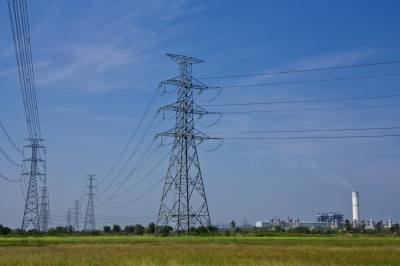
MARK COLVIN: Meanwhile in Victoria, environmental groups are already considering legal action over today's announcement that a new billion-dollar coal-powered station can be built in the Latrobe Valley.
It's meant to be a demonstration project, to establish whether creating synthetic gas with coal will work. Victoria's Environmental Protection Authority says it's satisfied the plant will be built at world's best practice standards and deliver a 30 per cent reduction in greenhouse gases compared to current brown coal plants.
But environmentalists says the money should be spent on coal-free technologies.
Mary Gearin reports.
PROTESTERS (CHANTING): EPA, EPA, Soon pollution, A-OK.
MARY GEARIN: It didn't take long for the protests to start. About 30 activists gathered outside the offices of the Environment Protection Authority in Melbourne. They're outraged by the authority's green light for a new 300-megawatt coal-fired power plant from HRL Dual Gas.
The project relies on technology that creates syngas or synthetic gas, from coal. The gas is primarily made up of hydrogen.
EPA CEO, John Merritt, says the 'demonstration project' has met world's best-practice standards.
JOHN MERRITT: The technology effectively converting coal into syngas, does provide for a significant reduction, about a 30 per cent reduction, in greenhouse gas emissions.
It is a significant opportunity to demonstrate this technology, but in applying the Environmental Protection Act the EPA has ensured that it's both a viable demonstration, but it also has to meet those best-practice standards.
MARY GEARIN: Is the EPA in effect, saying that it wants to investigate cleaner coal, if you like, as an acceptable form of alternate form of energy?
JOHN MERRIT: What the EPA is saying to this business, and other businesses and to the community, is that they can predict how we will deal with these contentious issues. Where projects comply with the principles of the Act and that standard, we will allow them to proceed. Where they don't we won't.
MARY GEARIN: The EPA has approved only one gasifier and turbine, but not the second turbine that the company wanted. It will only be approved if the first stage is shown to work. And the authority has imposed noise and sulphur dioxide emission standards on the project.
But Kelly O'Shannassy of Environment Victoria is unimpressed by the claims of environmental cleanliness.
KELLY O'SHANNASSY: We do not believe that this is best-practice energy production and the EPA is required by law to meet best practice. So we'll have a look at that and we'll assemble our legal team together next week to have a look to see if we have, what options we have legally or otherwise.
Coal is polluting any way you look at it. There is no such thing as clean coal and no-one's been able to perfect clean coal. So there are far cleaner alternatives in Victoria ready to go that have had all of their approvals: very efficient gas and of course wind and solar energy.
MARY GEARIN: John Merritt says the EPA was not required to compare this project's technology to alternate forms of energy.
JOHN MERRITT: We were clear that our interpretation of the Act and our application of the best-practice standard was to compare this technology against alternative brown coal technologies and power generation.
MARY GEARIN: Notwithstanding the Act, if the EPA is about protecting Victoria's environment overall, why shouldn't it be looking at the bigger picture and considering alternate energy sources?
JOHN MERRITT: Look it's important for environmental regulators everywhere to work within the legislation that they have.
MARY GEARIN: Community groups from the Latrobe region where the plant will be built have welcomed the decision for the jobs it will bring. The project is to receive $100 million from the Federal Government, and $50 million from the State Government.
Kelly O'Shannassy says it's a short-sighted project given the imminent carbon tax.
KELLY O'SHANNASSY: It just shows that I think our governments are addicted to coal and they're, at this point in time, not willing to invest in the clean-energy future that we need in this country. And they're still hanging on to the old jobs and the coal jobs of the past, which simply, under climate change, aren't going to be there in the future.
MARK COLVIN: Kelly O'Shannassy of Environment Victoria, speaking to Mary Gearin.
Article Courtesy of: http://www.abc.net.au

